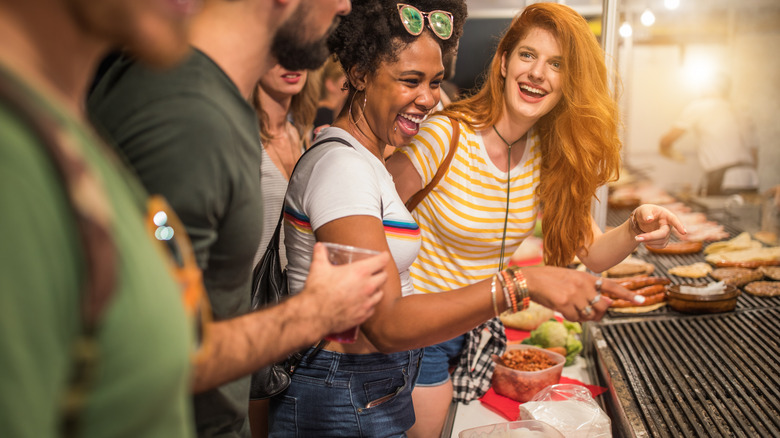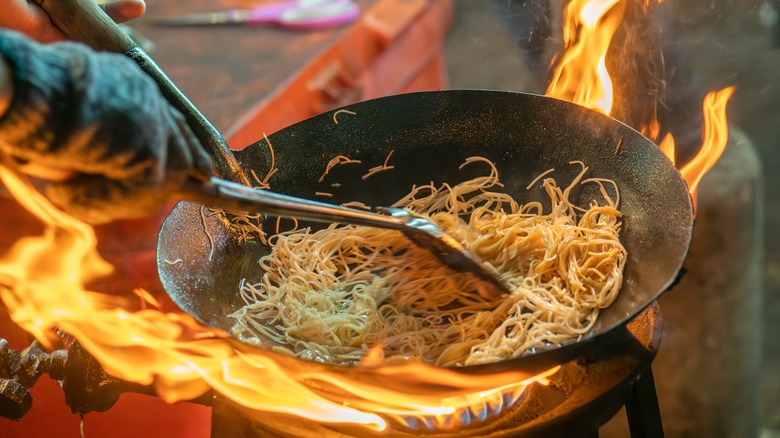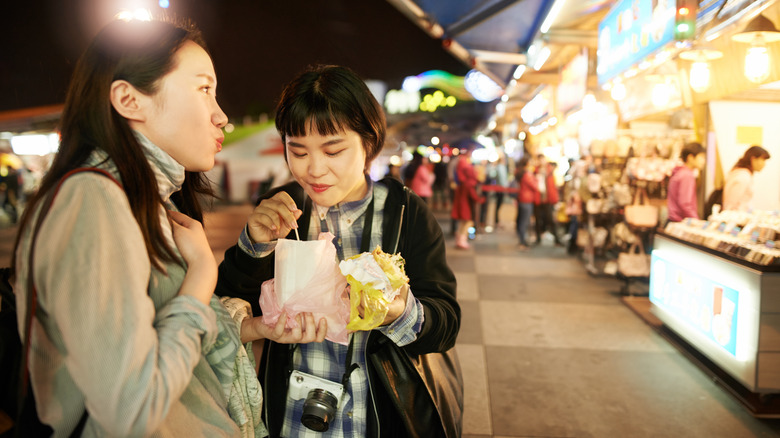The Easy Ways To Tell Whether Or Not A Street Vendor's Food Is Safe To Eat
There's something about street food abroad that just hits the spot. Whether you're weaving your way through a popular Bangkok food market or sipping on a stance-altering lemonade in the heart of Naples, hitting the streets in search of some local delicacies is usually the best way to "do as the locals do" and sink your teeth into some pretty mouthwatering flavors. However, no matter where you go, there's always one slight concern: Are you going to get food poisoning while on vacation?
Per an article published in 2015 by the National Library of Medicine, diarrhea typically affects between 30% and 70% of international travelers during or after their trip. Luckily, there are several ways to try and ensure that the food you're eating isn't contaminated by potential harmful pathogens that could land you in bed — or worse, the hospital — for days on end. And don't worry, they don't involve you turning into a full-on health inspector, either.
That said, one of the most important tips, no matter where you go, is to make sure you keep a close watch on who's handling the food, as well as who's handling the money. Ideally, you'll want to have two separate people taking care these two things in order to avoid any potential cross-contamination. If that's not the case, you'll at least want to see whoever's prepping and cooking the food wear gloves while cooking, and then take them off when grabbing the cash. After this, it's mostly about common sense.
Why do certain street foods make you sick?
Put simply, food poisoning typically happens when the food or drink you consume is contaminated with harmful bacteria, viruses, or parasites. Whether it's a dodgy bit of sushi, a fruit juice made with non-potable water, or a piece of improperly cooked meat, food poisoning can happen anytime, anywhere. With that in mind — and although there are certain destinations around the world that often get a bad reputation for the safety and cleanliness of their street food — the reality is that a bad batch of food and drink can happen anywhere in the world, especially if whoever's prepping the meal isn't careful about their hygiene.
From purchasing the ingredients to serving things up, personal care and food hygiene play a major role in preventing foodborne illnesses from spreading — and attacking unsuspecting travelers just looking for a quick snack. In most cases, useful precautions include cooks and servers washing their hands, using potable water to wash ingredients, preventing the food from sitting out too long in the sun or heat, ensuring proper cooking temperatures, and keeping preparation areas and utensils clean and sanitized throughout the process.
More ways to enjoy street food safely
Don't worry, though — wanting to enjoy a touch of local street food doesn't necessarily mean that you're bound to end up with a stomach bug while traveling. It just means you need to be a little more careful with the food and drink choices you make. For starters, the best way to ensure that you're eating good, safe, and clean street food is to be on the lookout for busy stalls with lots of locals. This usually means that the food is delicious — it's clearly local-approved, after all — and that it's popular enough to keep people coming. Plus, this also likely means that the vendor has to keep their stall stocked with fresh ingredients (especially if they're constantly selling out), so it's less likely that something will have been sitting around for too long.
Once you've picked your stall, keep your eyes peeled for basic hygiene and cleanliness practices in and around it. Is there any visible dirt or mess? Does the vendor handle food (or cash) with bare hands? Does something smell a little off? Sometimes, it's best to trust your instincts in terms of food safety. From there, the choices you make are all about minimizing risks and choosing your food smartly. As a quick guide, it's typically best to keep away from any undercooked or raw meats, avoid ordering icy drinks, steer clear from salads and pre-peeled fruits, and even say no to dairy (especially in warmer climates).


